Security Forces Arrest Scores Of Citizens In Iran's Kurdistan
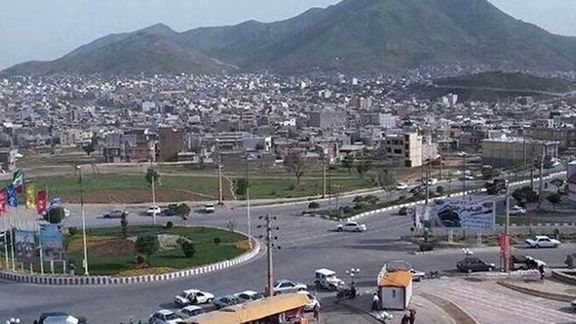
Scores of Iranian Kurds have been arrested in two regions in the Iranian Kurdistan province, two human rights monitoring groups reported on Friday.

Scores of Iranian Kurds have been arrested in two regions in the Iranian Kurdistan province, two human rights monitoring groups reported on Friday.
Several residents in villages around the town of Saqez were rounded up by security forces and taken to an unknown location, Hengaw, a Kurdish rights group said. Abdollah Mahjuz, a former political prisoner and his cousin Mohammad Mahjuz were among those detained.
The reason for the arrests is not clear, but security forces regularly detain Kurdish citizens on suspicions of political activities or membership in underground groups.
Hengaw also reported that 20 people were arrested around the town of Baneh in Kurdistan. The Kurdistan Human Rights Network, another monitoring group, also reported that dozens of agents in civilian clothes stormed several other villages near Baneh and arrested ten people. Local sources told the rights group that agents entered home and after confiscating personal items, detained citizens with verbal and physical violence. In some cases, agents beat up family members who prevented their illegal entry into their homes.
These reports also said that security personnel are present in Baneh’s streets and nearby villages.

The FBI has warned US companies that Iranian hackers are searching cybercriminal websites to obtain stolen information to use in their future activities.
The warning was issued in a private industry notification, first reported by Bleeping Computer, a cybersecurity news website on Wednesday.
Iran has a strong network of state hackers who regularly target American, Israeli and other government and company computers, both for disruption and for obtaining sensitive information.
The Federal Bureau of Investigation warned that any information obtained from the dark web by Iranian hackers can be used to penetrate the networks of more organizations.
While it is not clear which Iranian group is involved in the attempt to get information from cybercriminals, the FBI warned organizations to take steps to protect themselves against future attempts by these operators who both pursue ransom and security objectives.
Some cybersecurity experts believe that targeting entities for ransom by Iranian hackers could be a tactic to blur the line between criminal and state operatives, pretending they pursue profits rather than espionage.
In late October, an Iranian hacking group called Black Shadow attacked an Israeli data and internet company, stealing a large amount of client information and demanding ransom.

A major shift in a reformist party in Iran is likely to change the Islamic Republic's political landscape and help restore the reformists' status in the system.
The right-of-center reformist Executives of Construction Party in Iran has kicked out Gholamhosein Karbaschi, a moderate conservative politician who has been leading the party for a quarter of a century and replaced him with a more proreform figure, Hossein Marashi, the party's former spokesman.
Some have noted that Karbaschi knew he was going to be replaced in a Tuesday evening meeting of the party's central council, which he did not attend.
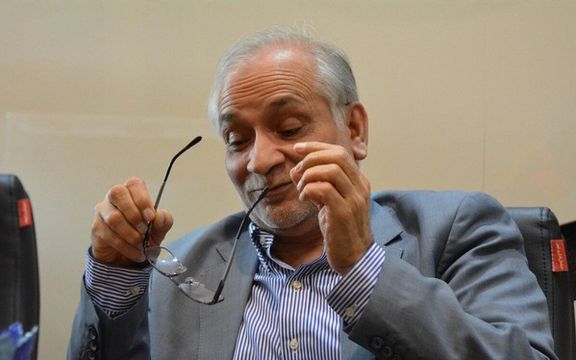
According to reformist daily Arman, the party's central council members decided unanimously to fire Karbaschi and replace him with Marashi, a relative of former President Akbar Hashemi Rafsanjani who was the founding father of the Executives of Construction when it was established in 1996. Marashi led the party's left wing throughout the past 25 years. The wing was identified with Rafsanjani's outspoken daughter Faezeh Hashemi who refused to take part in party meetings for several years in protest to Karbaschi's leadership.
Several key members of the party quit during the past few years, but the drop in membership and the rift among key members of the central council has been more visible in the past two years, as dissatisfaction with Karbaschi's handling of the parliamentary and presidential elections in 2020 and 2021 utterly annoyed even some loyal members. Mohammad Atrianfar, a key member said those who have left the party can easily return as the central council has not approved their resignation.
In the meantime, hardline news outlets such as the IRGC-linked Tasnim news agency have expressed support for Karbaschi and maintained their critical view of the party, Arman newspaper observed.
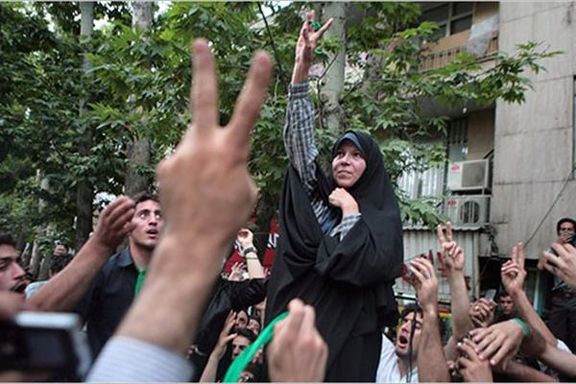
Meanwhile, a commentary in reformist daily Etemad characterized the development as a sign of the party moving to the left. In other words, the Executives of Construction is likely to be branded as an all-out reformist party.
According to Sharq newspaper, some of the inactive members including Akbar Torkan, a proreform figure with close ties to Supreme Leader Ali Khamenei, were present at the party's central council meeting. Some media outlets have taken this as a sign that the presence of trusted individuals like Torkan can strengthen the party's position within the ruling establishment. If Khamenei deicides, as he did before, that the country needs two political wings, then the Executives of Construction can act as the reformist wing. Currently, ultraconservatives dominate state institutions.
The meeting on Tuesday night gave the upper hand within the party to the Rafsanjani clan with Marashi as secretary general, Rafsanjani's son as the head of the central council and the high likelihood of Faezeh Hashemi's return to the forefront of the party's leadership.
According to the moderate website Rouydad24, under Karbaschi, during the past two years, the party lost its political impact in both local and national elections. The party's candidate for the presidential election, Abdolnaser Hemmati, who was supported by only part of the party, badly lost the election. To make the situation even worse for Karbaschi, the website quoted Atrianfar as having said that the party's central council did not meet during the past year or so, meaning that it was Karbaschi and not the party that nominated Hemmati.
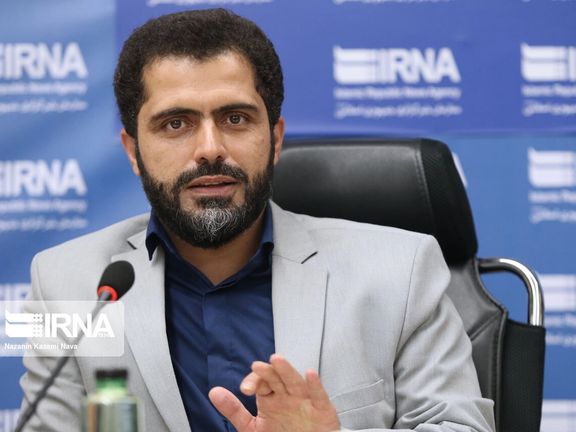
The CEO of Iran's government official news agency IRNA has tweeted that $3.5 billion of Tehran's frozen funds were released, without providing any details.
Ali Naderi, who is close to sources of information in President Ebrahim Raisi’s government, did not provide any details as to which country released the funds.
“Less than 100 days after the 13th government took office, $3.5 billion of Iran’s frozen funds in one of the countries was released and a considerable part of it is entering the commercial market,” Naderi tweeted.
Iran has around $20 billion frozen in several countries because of US banking sanctions imposed in 2018, when the United States pulled out of the Obama-era nuclear deal called JCPOA.
South Korea holds around $7 billion and had been targeted by Tehran’s pressures to release the funds.
There has been no indication by the Biden Administration that funds have been released.
In October, Iran’s Foreign Minister Hossein Amir-Abdollahian said that Tehran wants US to allow $10 billion to be freed as a show of “goodwill” before talks on Iran’s nuclear program resume.
Iran’s currency, rial, has dropped by around 20 percent since Raisi took office in August, due to lack of oil exports and pessimist about the JCPOA talks.
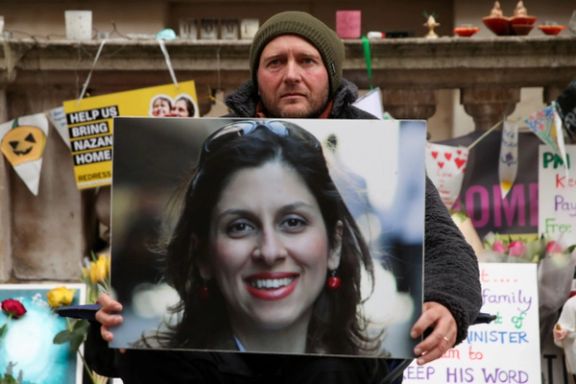
Britain on Thursday said that officials had pressed Iran's deputy foreign minister Ali Bagheri-Kani to release detained dual nationals and rejoin nuclear talks.
British foreign office officials also told Bagheri Kani at a meeting in London that Iran should conclude the Joint Comprehensive Plan of Action (JCPOA) nuclear deal under the terms on the table now, the foreign ministry said.
"The Iranian Deputy Foreign Minister was also pressed on the need for Iran to urgently release all British nationals unfairly detained in Iran, including Nazanin Zaghari-Ratcliffe, Anoosheh Ashoori and Morad Tahbaz," the Foreign, Commonwealth and Development Office said in a statement.
Zaghari-Ratcliffe was arrested at a Tehran airport in April 2016 and later convicted of plotting to overthrow the clerical establishment.
In April, an Iranian court sentenced Zaghari-Ratcliffe to a new term in jail on charges of propaganda against Iran's ruling system, just a month after she finished a prior five-year sentence.
Her husband, Richard Ratcliffe, is on a hunger strike to highlight her case. He met British minister for the Middle East James Cleverly on Thursday.
"If I'm honest, quite a depressing meeting," Ratcliffe told reporters after he left the Foreign Office, adding that Cleverly told him the meeting with Bagheri Kani had been cordial.
"(Cleverly) couldn't give a timeline on when things were going to move forward."
The FCDO said Cleverly had reaffirmed the government's commitment to reuniting Zaghari-Ratcliffe with her family in the UK.
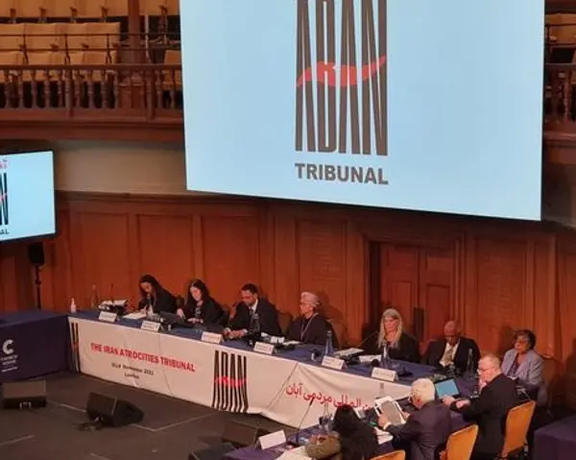
The second day of the ‘Iran Atrocities Tribunal’ continued Thursday with oral testimonies from anonymous witnesses, including a former police officer and two protesters.
The tribunal, which styles itself a “Russell tribunal” after the late British philosopher Bertrand Russell, convened in London Wednesday to examine the atrocities of violence against protesters in Iran in November 2019. Iran declined an invitation from the organizers to take part.
Social media traffic showed great interest among Iranians in following the proceedings and posting comments.
‘Witness 195,’ who said he was a former major in the Iranian police, testified via video-link disguising his voice to protect his identity, that he had refused a command from an officer in the Revolutionary Guards (IRGC) to deploy his 60 officers to suppress the protests in a city in the west of Iran. He said he had told the police under his command they had “no right to use firearms against unarmed protesters.”
Witness 195 claimed he had seen "plainclothes agents of the IRGC and intelligence ministry spraying the protesters with bullets,” killing 15 on November 19. "Armed [agents] shot at protesters with no purpose other than intimidating them," he said. The witness said that the security forces had destroyed public property and blamed protestors.
Witness 195 said he was arrested a few months later for disobeying an order to shoot at the protesters, held in solitary confinement and subjected to psychological torture. He said he had been sentenced to nearly six years in prison but that the sentence had not been enforced.
‘Witness 128’ testified in person that he had witnessed the killing of two protesters in the southeastern province of Sistan-Baluchestan.
After the tribunal was shown video footage of protests on a road leading to Rask, a city of Sistan-Baluchestan, witness 128 said he had seen IRGC forces 200 meters from where the film was taken, and claimed they had shot at protesters from nearby villages trying to reach Rask by the road.
‘Witness 366,’ testifying via videoconference, displayed an x-ray, which he said was of his chest and showed a bullet, lodged in his spine on November 16, 2019, that had put him in a wheelchair. Witness 366 told the tribunal he was certain he had been shot by security forces and not by armed protestors.
The tribunal on Thursday also heard Raha Bahraini, a researcher at Amnesty International, report that many arrested protesters, including children, had been sexually assaulted, raped, or tortured by hanging and staged executions.
"This people's tribunal is very important," Bahraini told Iran International. "It's a strong initiative against the continued impunity for crimes in Iran," she said. Bahraini said there was no chance of justice through the Iranian judicial system so responsibility fell on the United Nation's Human Rights Council and the United Nations Security Council to bring those responsible for the “atrocities” to justice.